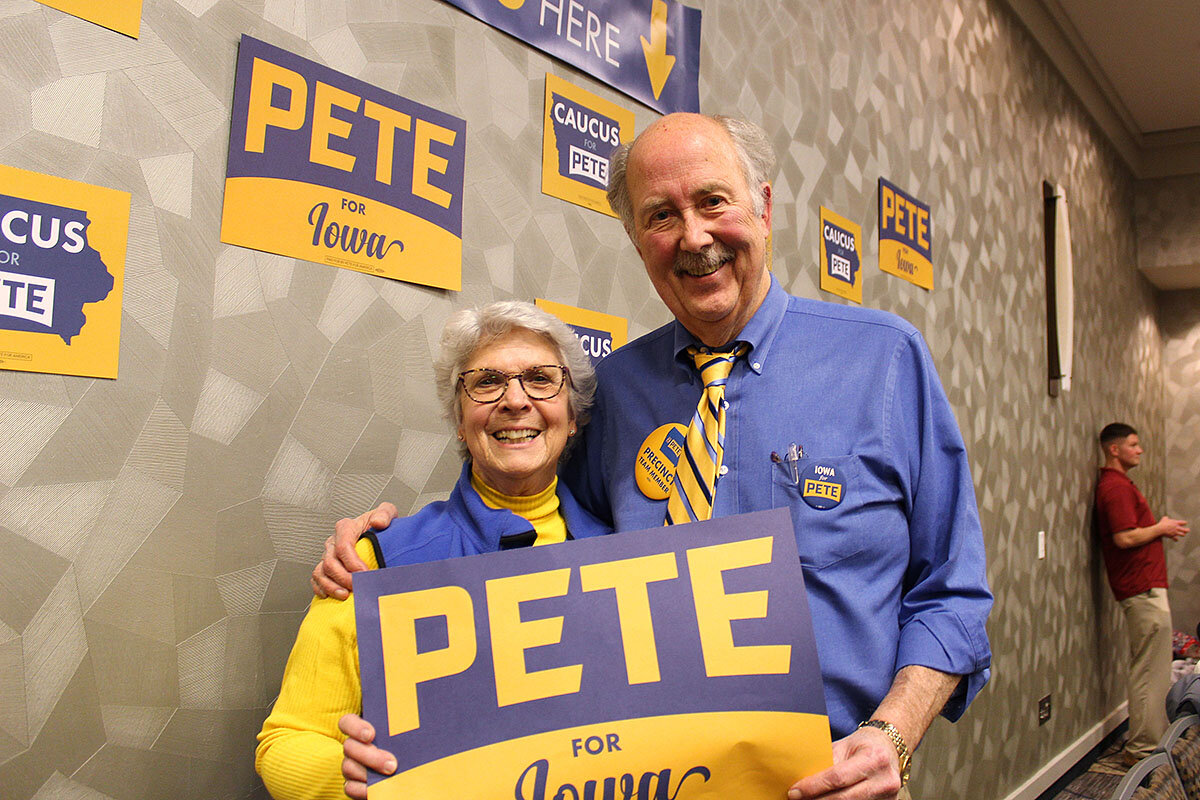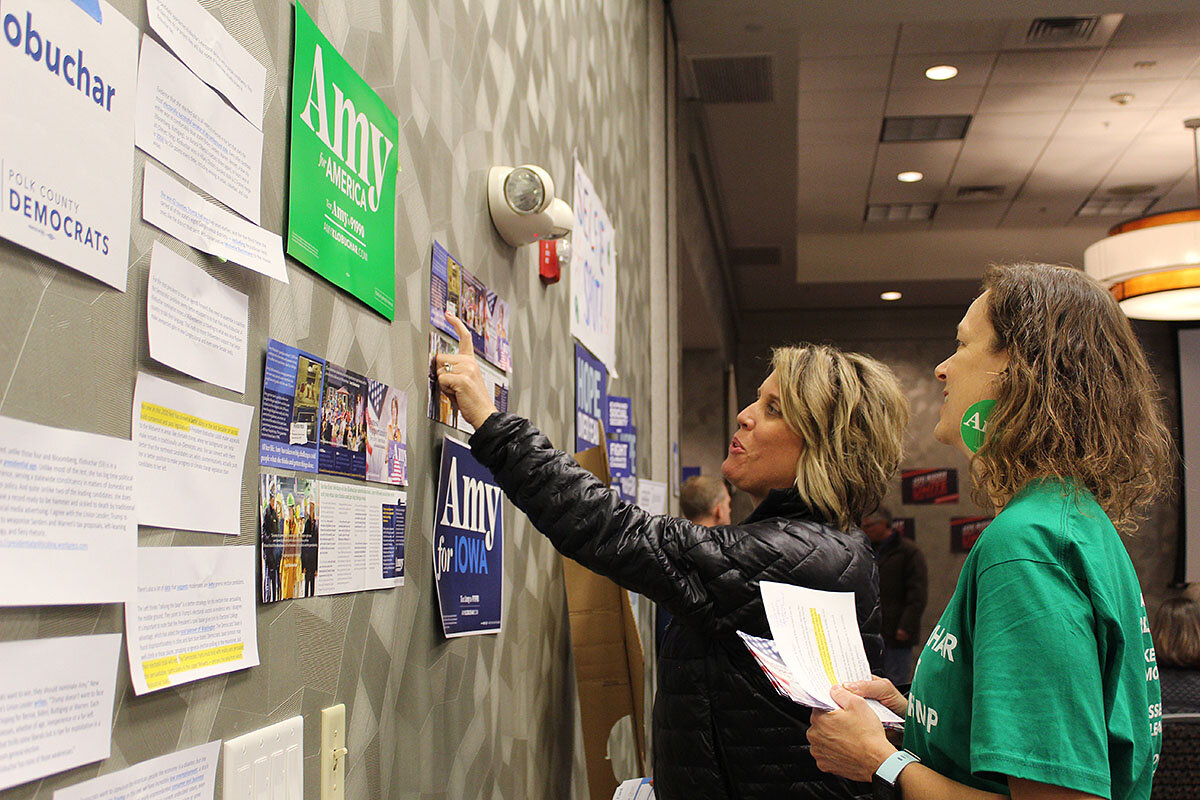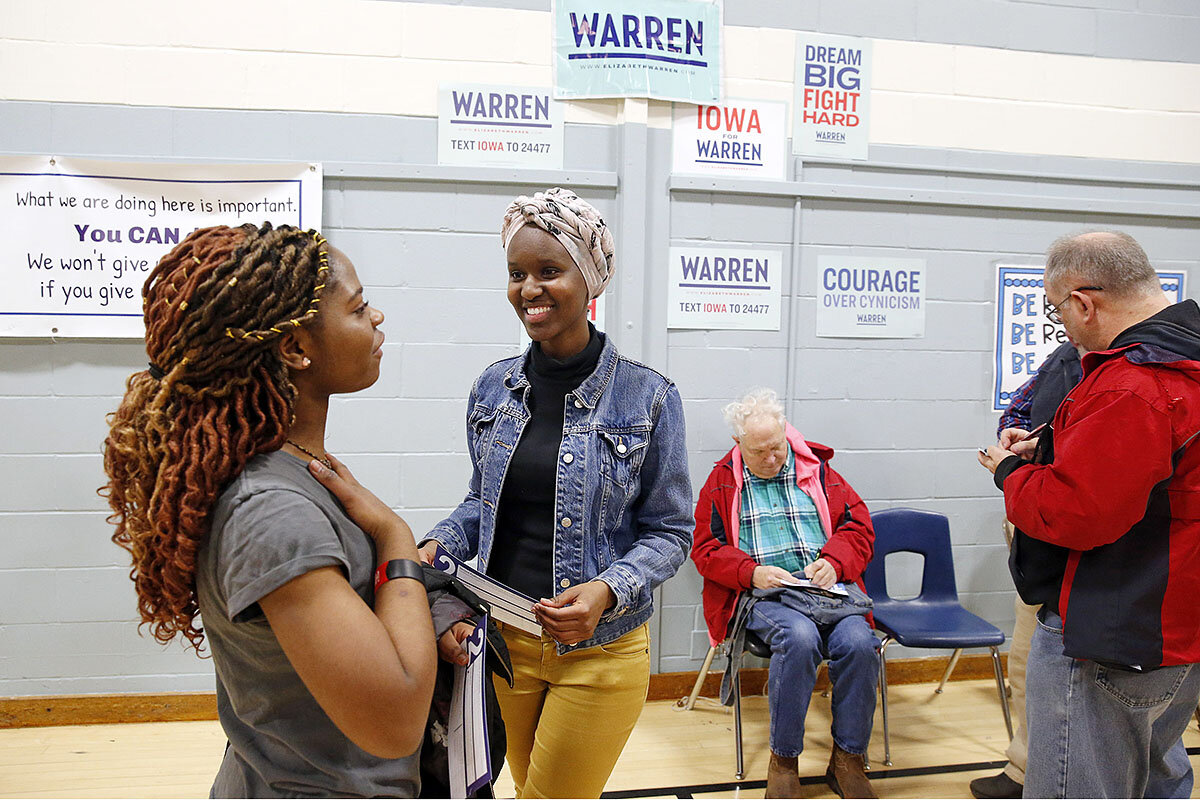Iowa caucus debacle a wake-up call for American democracy
Loading...
| Ankeny, Iowa
Deborah West, dressed head to toe in yellow and blue, was giggling with excitement.
Pete Buttigieg, her preferred candidate, had just won the caucus in the 13th precinct of Ankeny, Iowa – at least, according to the projector at the front of the Marriott conference room.
“I’m just tickled that he did so well,” Ms. West said last night.
Why We Wrote This
The delay in caucus results – and doubts about their accuracy – sowed distrust in Iowa’s vaunted civic exercise. But the debacle may spur needed reforms in election security in the run-up to the presidential election this fall.
But that giddiness turned to confusion and then frustration, as it became clear overnight that state party leaders weren’t nearly so sure about the results, due in part to technical difficulties with a new app for tallying results.
“I woke up this morning thinking, ‘Oh dear, Iowa. What have you done?’” sighs Ms. West, who has been caucusing here for decades.
In the first presidential nominating contest since Russian interference sowed doubt and distrust about the 2016 election, the Iowa caucus debacle has triggered a frenzy of national speculation about the integrity of results that will set the tone for this campaign season. It has not only called into serious question whether Iowa will be trusted to carry out the first-in-the-nation caucuses ever again, but has amplified concerns that have been building ever since the 2000 election, when Bush v. Gore raised questions about the accuracy and fairness of American election results.
At issue is not only which candidate won, but how the nation will react to yet another high-profile challenge to the civic trust that is a pillar of any democratic society. But Iowa’s botched caucuses can also be seen as an opportunity, galvanizing everyone from local officials to the federal government to urgently address election vulnerabilities.
“This is a preview of the kind of things that could go wrong in November when the stakes will be higher and emotions will be hotter,” says Richard Hasen, author of “Election Meltdown: Dirty Tricks, Distrust, and the Threat to American Democracy,” which is out today. “What happened yesterday was a wake-up call. We have nine months to make things better.”
At 5 p.m. Tuesday, the Iowa Democratic party chair apologized and said officials “were going to take the time we need to verify the results.” With 62% of the precinct results, Mr. Buttigieg had a narrow lead with 27% of state delegate equivalents, with Sen. Bernie Sanders just behind with 25%. Sen. Elizabeth Warren placed third place at 18%, former Vice President Joe Biden got 16%, and Sen. Amy Klobuchar came in fifth.
To be sure, many aspects of the Iowa caucus were run flawlessly, and officials are cautioning against impatience and overreaction. But a decentralized electoral system is only as strong as its weakest link.
Experts say there are reforms states can make to ensure greater accuracy and security. At the same time, the media could do a better job combating misinformation when things go wrong, and educating voters about being patient rather than conditioning them to expect instant results. While it’s important to recognize signs of foreign meddling and other forms of fraud, it’s also crucial not to see boogeymen behind unintentional human error.
“Not every snafu is a rigging of election results, and we need to call out people who make such comments,” says Professor Hasen, who teaches law and political science at the University of California, Irvine. That said, he adds, “There are domestic and foreign forces who will try to make things worse for American democracy, and we need to make sure we remember we have a fragile system. It needs attention and it’s under attack.”
“We did our job on the ground!”
To Democratic leaders on the ground in Ankeny, a fast-growing suburb of Des Moines, last night’s caucus went better than ever in terms of organization.
Mary McAdams, chair of the Ankeny Area Democrats, says they ran 23 flawless precincts. “The only fly in the soup is this app,” she says, referring to the state Democratic Party’s new tool for tallying caucus results. “We did our job on the ground!”
Despite having nearly 50% more people turn out than in 2016, the check-in process was so seamless that many of the Ankeny caucuses were able to start right at 7 p.m., instead of taking up to an hour to register participants as usual. That was thanks in part to having more volunteers and better training.
So the caucus chairs of Ankeny’s 13th precinct, Kelsie Goodman and Megan Albaugh, both employees at the local high school, woke up surprised by this morning’s news trumpeting Iowa’s failure.
Ms. Albaugh said the app worked well and helped her do the math easily. Yes, she had a difficult time loading a photo of the spreadsheet they work on, but it was faster than doing it all by hand – especially given the two-inch-high stack of new registrants.
“We want to make sure all of our T’s are crossed and I’s are dotted,” says Ms. Albaugh. “Do you want accurate results or fast results?”
The Iowa Democratic Party revised its caucus rules and procedures this year as a result of complaints from people from the Bernie Sanders camp, who were angered by the lack of transparency in 2016. The app was supposed to help with the new way of tallying three different categories of results, but many people on the ground are frustrated that it was rolled out without adequate training and testing. Many local chairs reported having trouble using the app, and when they tried to call their results in, they were put on hold – sometimes for hours.
“I don’t understand why an untested app was introduced when we should have been more focused on building credibility and building faith in our process,” says Angie Hagerty, a Sanders ambassador for Ankeny’s 13th precinct.
She is especially concerned about how this has marred the caucuses in the eyes of young people and other first-time participants. Her college-aged daughter who caucused for Senator Sanders in Iowa City texted her asking, “Does my vote even count? The world is laughing at us.”
“I said, ‘Honey, you stood up for what you believed in, and you went and caucused. That’s what’s important.’”
Even before the delay and malfunction, many Democrats were up in arms about Iowa’s outsize influence on the election. Though it has a growing minority population, Iowa’s 91% white population is not reflective enough of the party’s diversity to warrant the weighty role it plays in winnowing the presidential field, critics contend.
Supporters counter that the state provides small, intimate spaces for the candidates to connect with voters and hone their message through retail politics. Iowans provide a perspective that moderates the extremes of the coasts, they say, and take seriously their civic responsibility.
“I’ve been taking my kids to the caucuses since they were babies in their car seats,” says Ms. Hagerty. “We’ve passed this tradition down to our kids.”
Now there are added questions of competence, however, which means the debate is likely to grow even louder before the next election cycle. Iowa Republicans are all too conscious of what this could mean for their own caucus in 2024.
“Iowa’s unique role encourages a grassroots nominating process that empowers everyday Americans, not Washington insiders or powerful billionaires,” wrote Sens. Chuck Grassley and Joni Ernst, together with Iowa Gov. Kim Reynolds, all Republicans. “The face-to-face retail politics nature of Iowa’s caucus system also encourages dialogue between candidates and voters that makes our presidential candidates accountable for the positions they take and the records they hold.”
“The process is not suffering because of a short delay in knowing the final results,” they added.
Ms. West worries that the caucus mess will add to negative stereotypes of Iowans as a bunch of farmers and unsophisticated people.
“If it’s taken away, I will miss it,” she says. “It’s gotten people like me a lot more involved and interested. ... But maybe we can make it more fair for the whole country.”
Is this another crack in pillars of U.S. democracy?
After pouring millions of dollars into crisscrossing Iowa over the past year, in hopes of winning the first contest, which gives the front-runner crucial momentum and helps to winnow the field, candidates are facing the prospect that none of them may get that boost they were vying for.
They still came out last night before catching planes to New Hampshire, but without definitive data, their speeches ranged from vague to presumptive. Mr. Buttigieg was criticized in particular for essentially claiming victory without any official validation.
“We don’t know all the results,” he said. “But we know, by the time it’s all said and done, Iowa, you have shocked the nation, because by all indications, we are going on to New Hampshire victorious.”
Professor Hasen says the Iowa Democratic Party was not ready for prime time, and should have had much more extensive testing on their app and better training for those who were tabulating. Elections are hard to run well, and pockets of election administrator incompetence combined with places that are rolling out new rules or machines raise concerns.
There are also internet rumors, thus far unfounded, asking if Russia was behind these technological glitches.
Sen. Mark Warner, a Virginia Democrat who is co-chair of the Senate Cybersecurity Caucus, said in a statement that there’s no indication of malicious cyberactivity.
“But the continuing chaos in Iowa is illustrative of our overall failure to take sufficient steps to protect the integrity of our election systems,” he said, reiterating the need for a voter-verified paper trail as a backup to electronic election systems. Though all of Iowa’s nearly 1,700 precincts reportedly have a paper trail of caucus night, elsewhere in the country many local election administrators have no such backup in case the electronic voting machines malfunction. Democrats in Congress have been pushing for additional funding for paper ballots ahead of the November presidential election.
The vacuum of official results in Iowa has resulted in a swirl of misinformation, which is damaging to citizens’ trust in democratic processes. The president’s sons Donald Trump Jr. and Eric Trump are among those who have tweeted that the delay is due to the Iowa Democratic Party “rigging” the election.
“As we get further into the 2020 primaries, what happened in Iowa is an early warning sign that Congress, local officials, and the social media platform companies have much more work to do to ensure the integrity of our elections,” said Senator Warner.
“It’s pitiful,” agrees Ms. West. “I’m not a tech-y person, so I can’t point fingers, but my goodness. Somebody really dropped the ball.”
The lack of timely results has also dampened her enthusiasm for the apparent success of her favorite, Mr. Buttigieg.
“It takes all the bloom off the rose,” says Ms. West.








